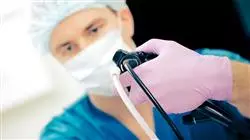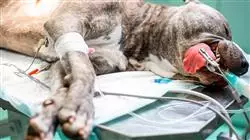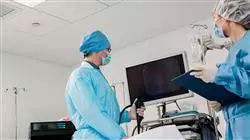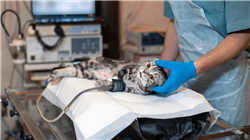University certificate
The world's largest faculty of veterinary medicine”
Description
This program includes exceptional teaching material, providing you with a contextual approach that will facilitate your learning”

Minimally invasive techniques used in veterinary medicine for the diagnosis and treatment of various diseases found in small animals began 20 years ago and have grown exponentially in the last decade.
This growth, which goes hand in hand with the growth of Human Medicine in this field, has been due to several factors: technical development, equipment and instruments, which increasingly offer higher quality images and are more affordable, the development of specific diagnostic and therapeutic techniques in this field, as well as professionals, increasingly trained, which include, preferably, the approach, through these minimally invasive techniques, most of their clinical activity, in addition to owners increasingly concerned about the health of their pets who demand more specialized clinical services, more accurate clinical diagnostics and less invasive treatments which results in less pain and shorter hospital stays for their pets.
The professors on this Postgraduate diploma are at the forefront of the latest diagnostic techniques and treatments of diseases in small animals. Due to their specialized expertise, they have designed a useful, practical program adapted to the current situation, an increasingly demanding and specialized reality.
The teaching staff has selected a syllabus that generates specialized knowledge with an overview of the importance of minimally invasive techniques for the diagnosis and treatment of many diseases affecting small animals, in the description of equipment, instruments, approaches in minimally invasive surgery, anesthesia and the most frequent complications.
It provides high-quality multimedia material on the different surgical techniques, from the simplest and most common to the most technically complex.
As it is an online program, the student is not conditioned by fixed schedules, nor do they need to move to physically move to another location. All of the content can be accessed at any time of the day, so you can balance your working or personal life with your academic life.
This program is the best option you can find to specialize in Digestive, Respiratory and Urogenital System Endoscopy in Small Animals and make more accurate diagnoses"
This Postgraduate diploma in Digestive, Respiratory and Urogenital System Endoscopy in Small Animalscontains the most complete and up-to-date scientific program on the market. The most important features include:
- The development of case studies presented by experts in Minimally Invasive Surgery in Small Animals
- The graphic, schematic, and practical contents with which they are created, provide scientific and practical information on the disciplines that are essential for professional practice
- New developments in Minimally Invasive Surgery in Small Animals
- Practical exercises where self-assessment can be used to improve learning
- Its special emphasis on innovative methodologies in Minimally Invasive Surgery in Small Animals
- Theoretical lessons, questions to the expert, debate forums on controversial topics and individual reflection assignments
- Content that is accessible from any fixed or portable device with an Internet connection
This Postgraduate Diploma is the best investment you can make in selecting a refresher program to update your knowledge in Digestive, Respiratory and Urogenital Endoscopy in Small Animals"
It includes in its teaching staff professionals belonging to the field of Minimally Invasive Veterinary Surgery, who bring to this program their work experience, as well as renowned specialists from reference societies and prestigious universities.
Its multimedia content, developed with the latest educational technology, will allow the professional a situated and contextual learning, that is to say, a simulated environment that will provide an immersive specialization programmed to train in real situations.
In order to do this, the professional will have the help of an innovative interactive video system made by recognized experts in Veterinary Surgery and with great experience. For this purpose, the professional will be assisted by an innovative interactive video system created by renowned and experienced experts in Veterinary Surgery.
Do not miss the opportunity to make this Postgraduate diploma in Digestive, Respiratory and Urogenital System Endoscopy in Small Animals with us. It's the perfect opportunity to advance your career"

Veterinarians must continue their education to adapt to new developments in this field"
Syllabus
The structure of the content has been designed by leading professionals in the Veterinary Surgery sector, with extensive experience and recognized prestige in the profession, backed by the volume of cases reviewed, studied, and diagnosed, and with extensive knowledge of new technologies applied to Veterinary Science.

This Postgraduate diploma in Digestive, Respiratory and Urogenital System Endoscopy in Small Animals contains the most complete and up-to-date Scientific program on the market”
Module 1. Digective Endoscopy. General Information, Techniques and Most Common Diseases
1.1. Introduction
1.1.1. History of the Digective Endoscopy
1.1.2. Patient Preparation
1.1.3. Contraindications and Complications
1.2. Equipment and Instruments
1.2.1. Equipment (Flexible and Rigid)
1.2.2. Additional Instruments (Clamps, Baskets, Hoods, Overtube, ...)
1.2.3. Cleaning and Processing of Equipment
1.3. Esophagoscopy
1.3.1. Indications
1.3.2. Positioning
1.3.3. Technique
1.4. Gastroscopy
1.4.1. Indications
1.4.2. Positioning
1.4.3. Technique
1.5. Duodenal Ileostomy
1.5.1. Indications
1.5.2. Positioning
1.5.3. Technique
1.6. Colonoscopy
1.6.1. Indications
1.6.2. Positioning
1.6.3. Technique
1.7. Endoscopic Management of Foreign Bodies in the Digestive System
1.7.1. Indications
1.7.2. Technique
1.7.3. Complications and Contraindiciations
1.8. Oesophageal Stenosis
1.8.1. Indications
1.8.2. Technique
1.8.3. Complications and Contraindiciations
1.9. Insertion of Feeding Tubes
1.9.1. Indications
1.9.2. Technique
1.9.3. Complications and Contraindiciations
1.10. Polypectomy and Mucosectomy
1.10.1. Indications
1.10.2. Technique
1.10.3. Complications and Contraindiciations
Module 2. Respiratory System Endoscopy. General Information, Techniques and Most Common Diseases
2.1. Introduction
2.1.1. History of the Respiratoy Endoscopy
2.1.2. Patient Preparation
2.1.3. Contraindications and Complications
2.2. Equipment and Instruments
2.2.1. Equipment (Flexible and Rigid)
2.2.2. Additional Instruments (Clamps, Baskets, ...)
2.2.3. Cleaning and Processing of Equipment
2.3. Rhinoscopy
2.3.1. Indications
2.3.2. Positioning
2.3.3. Technique
2.4. Laryngoscopy
2.4.1. Indications
2.4.2. Positioning
2.4.3. Technique
2.5. Tracheoscopy
2.5.1. Indications
2.5.2. Positioning
2.5.3. Technique
2.6. Bronchoscopy
2.6.1. Indications
2.6.2. Positioning
2.6.3. Technique
2.7. Endoscopic Management of Foreign Bodies in the Respiratory System
2.7.1. Indications
2.7.2. Technique
2.7.3. Complications and Contraindiciations
2.8. Nasopharyngeal Stenosis
2.8.1. Indications
2.8.2. Technique
2.8.3. Complications and Contraindiciations
2.9. Tracheal and Broncheal Collapse
2.9.1. Indications
2.9.2. Technique
2.9.3. Complications and Contraindiciations
2.10. Tracheal Stenosis
2.10.1. Indications
2.10.2. Technique
2.10.3. Complications and Contraindiciations
Module 3. Urogenital System Endoscopy General Information and Techniques in Most Common Diseases
3.1. Introduction
3.1.1. History of the Urinary Endoscopy
3.1.2. Patient Preparation
3.1.3. Contraindications and Complications
3.2. Equipment and Instruments.
3.2.1. Equipment (Flexible and Rigid)
3.2.2. Additional Instruments (Laser, Pincers, Baskets, Fibers, Hydrophilic Guides, ...)
3.2.3. Cleaning and Processing of Equipment
3.3. Urethrocystoscopy
3.3.1. Indications
3.3.2. Positioning
3.3.3. Technique
3.4. PCCL
3.4.1. Indications
3.4.2. Positioning
3.4.3. Technique
3.5. Percutaneous Nephroscopy
3.5.1. Indications
3.5.2. Positioning
3.5.3. Technique
3.6. Vaginoscopy
3.6.1. Indications
3.6.2. Positioning
3.6.3. Technique
3.7. UGELAB- Ultrasound-Guided Endoscopic Laser Ablation
3.7.1. Indications
3.7.2. Technique
3.7.3. Complications and Contraindiciations
3.8. Transcervical Insemination
3.8.1. Indications
3.8.2. Technique
3.8.3. Complications and Contraindiciations
3.9. Ureteral Stents
3.9.1. Indications
3.9.2. Technique
3.9.3. Complications and Contraindiciations
3.10. Intracorporeal Lithotripsy
3.10.1. Indications
3.10.2. Technique
3.10.3. Complications and Contraindiciations

This program will allow you to advance in your career in a seamless way"
Postgraduate Diploma in Digestive, Respiratory and Urogenital Endoscopy in Small Animals
Do you want to become an expert in endoscopy for the diagnosis and treatment of diseases in small animals? TECH Global University's Postgraduate Diploma is your opportunity to acquire the necessary skills and knowledge in this growing field. We are proud to offer a world-class program tailored to your needs. Our virtual classes allow you to access learning from anywhere, anytime, without compromising your current responsibilities. Learn at your own pace and reconcile your studies with your daily activities. During the 6-month program, you will immerse yourself in the exciting world of small animal endoscopy. You will delve into the most advanced techniques to perform endoscopic procedures in the digestive, respiratory and urogenital systems.
Advance in animal health care with our specialization in Small Animal Endoscopy.
By enrolling in the Postgraduate Diploma in Digestive, Respiratory and Urogenital Endoscopy in Small Animals, you will have a highly qualified teaching team composed of experienced professionals in the field of veterinary medicine. They will provide you with personalized guidance and share their knowledge and best practices to help you achieve success in this specialization. Upon completion of this fellowship program, you will be prepared to meet the challenges of small animal endoscopy. You will be able to perform accurate diagnoses and minimally invasive treatments, improving the quality of life of your patients and strengthening your professional career. In addition, TECH will award you with a recognized certificate, supporting your acquired skills and knowledge. enroll today and make a difference in animal healthcare!







